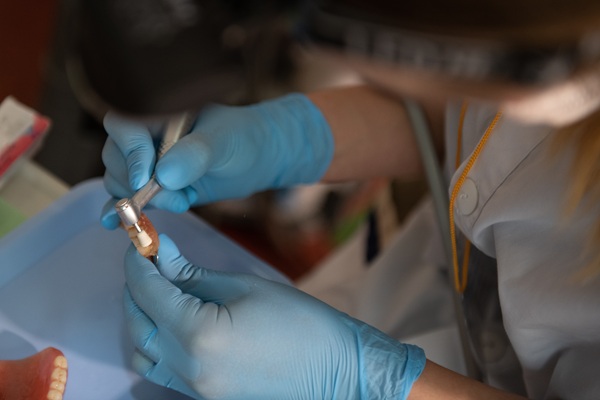 It is not surprising that adjusting to new dentures takes a little time. After all, you have new items in your mouth, and they will at first feel a little strange. Most people have enjoyed a mouth full of teeth for many years. You will also need to become comfortable chewing foods, drinking liquids, and speaking. Fortunately, over time your dentures should feel quite normal in your mouth.
It is not surprising that adjusting to new dentures takes a little time. After all, you have new items in your mouth, and they will at first feel a little strange. Most people have enjoyed a mouth full of teeth for many years. You will also need to become comfortable chewing foods, drinking liquids, and speaking. Fortunately, over time your dentures should feel quite normal in your mouth.
For most people, it takes about 30 days to get used to wearing dentures. Of course, some people adapt more quickly, while others take a bit longer to adjust. Since dentures are not your natural teeth, they act and feel differently than what you are used to. They also interact with your gums and other soft tissues in different ways. The experience is probably unique for each person fitted with dentures, whether it is a full or partial set.
Managing the first 30 days
Part of adjusting to new dentures is knowing what to expect and not getting frustrated. A short period of soreness and discomfort is to be expected. This means taking it slowly and heeding the advice of your dental professional. A few tips help the process along, including:
- Take a slow approach to eating at first.
- Start with soft foods such as pudding.
- Cut foods into small, manageable bites.
- Avoid chewing with your front teeth.
- Practice speaking alone or with a friend.
It is even possible to bite your tongue as you get used to dentures. In some cases, the dentures could shift in your mouth and even pop out of place. This is why the use of a denture fixative is so important. Some foods may have to be eliminated from your diet. These include sticky candies, hard nuts, and snacks such as popcorn.
While eating and drinking will be among the biggest challenges, you will also want to get comfortable with speaking and smiling. No doubt, your voice will sound a little different, but you will soon get used to that. Certain sounds might be more difficult to pronounce and might require some practice. You may have to practice smiling to get used to how that feels.
Learning how to care for dentures
While dentures serve as good replacements for lost teeth, they have somewhat different handling instructions. They should still be brushed every day, but you will probably find it is easier to brush dentures while they are out of your mouth. Also, do not brush with toothpaste, as this can damage dentures.
Adjusting to new dentures also means you should take them out every night and leave them in a water solution. If they seem discolored or have a buildup of plaque, you can use a solution of vinegar and water for more vigorous cleaning.
Conclusion
Getting used to dentures takes about a month for most people. If soreness or problems persist, your dentist can help you with better fitment or suggest additional solutions. In time, your dentures will allow you to do most of what you did in the past without pain or discomfort.
Request an appointment or call Roderick A. Garcia, DMD PC at 505-634-5029 for an appointment in our Albuquerque office.
Recent Posts
Most first-time denture candidates are nervous about adjusting to new dentures. They usually do not know what to expect, and they may wonder if dentures will feel natural.People get dentures for many reasons, such as broken or missing teeth, excessive tooth decay, gum disease, severe tooth pain or trauma, and painful sensitivity to hot and…
When a significant change comes to your life, it can be a little difficult to feel comfortable. This is often the case when adjusting to new dentures. At first, the dentures tend to feel a bit awkward in the mouth, and it may not be as easy to do certain things. Routine actions such as…
If patients are suffering from missing teeth or teeth that need to be removed, dentures can be one option for allowing them to continue to be able to use their mouth properly. Here are a few changes a patient should expect to make as part of adjusting to new dentures.Depending on the needs of the…


